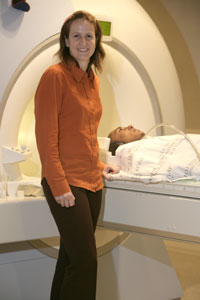Of mothering in mice and stressed-out men
23 November 2007 | Story by The CUBBI communications team
The chirping sounds of playful lab rats stem from the same types of brain function that generate laughter in humans? This was just one of the insights provided by Professor Jaak Panksepp, an affective neuroscientist and keynote speaker at the Symposium on Trauma and Resilience on 7 November.
Psychology's Professor Mark Solms described how exposure to traumatic events might result in the overproduction of dopamine, possibly leading to post-traumatic stress disorder.
Ernesta Meintjes (pictured left) of the Department of Human Biology illustrated how the recently acquired MRI scanner at the Cape Peninsula University's Brain Imaging Centre can be used for psychological research.
And Johan van Heerden of the Department of Molecular and Cell Biology outlined research on how gene expression in immune cells may be used to predict who is likely to experience psychological trauma.
The symposium showcased the range of expertise found on both UCT's Brain and Behaviour Initiative and the Cross-University Brain Behaviour Initiative.
For more information, visit the CUBBI website
 This work is licensed under a Creative Commons Attribution-NoDerivatives 4.0 International License.
This work is licensed under a Creative Commons Attribution-NoDerivatives 4.0 International License.
Please view the republishing articles page for more information.










